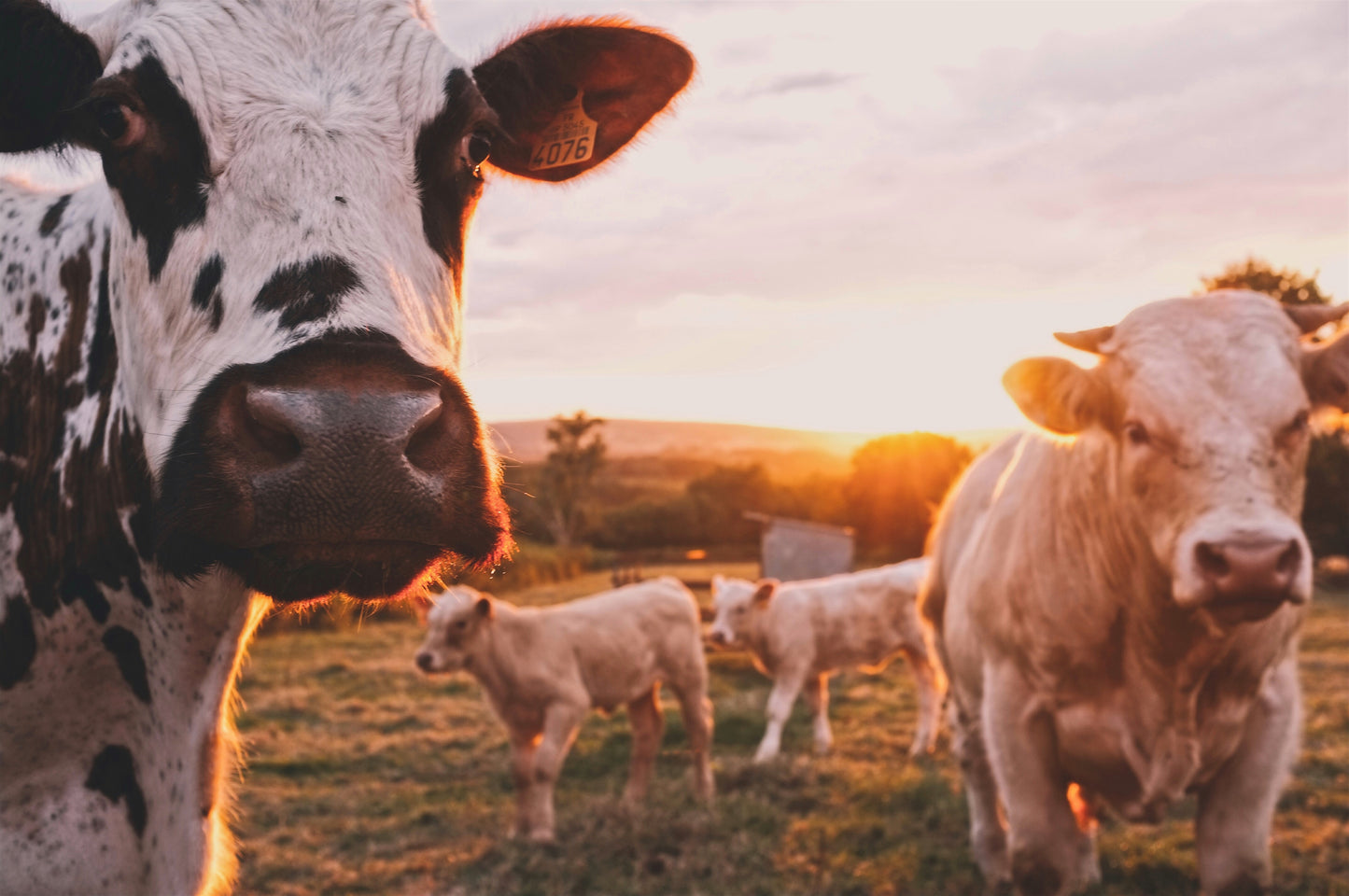
So what’s the difference between grass fed and grass finished cattle?
Most people are familiar with the term grass fed, but there’s a significant difference between grass fed beef and grass finished beef. Grass-finished beef comes from cattle that ate nothing but grass and forage for their entire lives. Unless beef is labeled 100% grass fed, then the term grass-fed, implies that the meat came from cattle which were started on a grass diet but had either received supplemental grain feed or were finished on a fully grain-based diet.
Cattle are not required to have a 100% grass-fed diet in order to be labeled as grass-fed on your beef’s packaging. Another point to that, “grass-fed” cows are not necessarily pasture-raised. At the grocery store, this means grass-finished beef may be labeled as grass-fed beef, but not vice versa.
How is grass finished beef important to our dog’s diets?
At Ryōken Instinct, the beef we source is 100% grass-fed, grass-finished, organic and free-range beef. There are several reasons to choose 100% grass-fed, grass-finished beef, including a number of significant health benefits. Grass-finished beef is 20% lower in calories than grain-finished beef and has higher levels of Omega-3 fatty acids, CLA’s, and Vitamins A and E. CLA is a fatty acid that has anti-carcinogenic properties. Grass-finished beef also contains 2-4 times more Omega 3 fatty acids than grass-fed beef. Omega 3 is essential for hormonal health, cognitive function, healthy skin, cardiovascular health, and keeping your dog's body's anti-inflammatory response under control. Grass-finished beef also tends to have higher levels of E, B vitamins, potassium, and magnesium. Generally, cows that are fed predominantly grass store more vitamin A in their livers. This translates into a much more nutrient dense bar for your dogs without the added inflammation properties of GMO and antibiotic beef.
The ranchers from where we source our protein operate are truly dedicated to sustainable farming practices. They provide a healthy diet for the cattle who are raised on a diet primarily consisting of hay, grass, and forage from pastures. They are later placed on a non-GMO, 100% vegetarian finishing ration. Cows raised in feeding lots often don’t have much space for movement and exist in crowded conditions. This can cause some stress to the animal, sending them into “fight or flight” and elevating cortisol levels. Over time, high cortisol levels can result in fat gain, which is another reason why grass-fed beef tends to have more unhealthy fat.
Grass-fed and grain-fed beef do still contain important nutrients like vitamin B, protein, iron, and zinc, but grain-fed beef contains four times more saturated fats than grass-finished beef, which is not healthy. Grass-finished cows also spend a lot of time roaming the pastures, maintaining a good fitness level, and producing lean meat. The grass-finished cattle we use for our bars is better for the environment, too! Cows actually produce a serious amount of methane byproduct. Methane gas amounts to a staggering 14.5% of global greenhouse emissions! Pasture-raised, grass-finished cows raised with rotational grazing can help rectify those greenhouse gas emissions, which are the farming practices used by our suppliers. Rotation grazing is a practice of moving grazing cattle between pastures on a regular basis, and it helps “carbon scrub” or remove carbon dioxide from the air and enriches the soil. Animals raised on feedlots don’t give back anything, and sometimes their diet is so poor that their manure is considered toxic waste.
Cows are grass eaters, so adding grain feed to their diet upsets their stomach’s acidity levels, disrupts digestion, and creates a breeding ground for bacteria. Grain-fed cows also ingest hormones as part of their diet. Synthetic estrogen, testosterone, and growth hormones are often used to fatten up cows at a quicker pace. When you or your dog eat hormone-treated beef, you or your dog are also ingesting the hormones that it was fed.
Grass-finished beef needs more presence in the pet industry for all of its nutritional benefits and environmental benefits. More often than not, a lot of pet companies cannot claim to use grass-finished beef in their product lines, but at Ryōken Instinct we value the longevity of your dog’s health while also practicing ethical sourcing. We are committed to providing your canine companion the healthiest options available.
